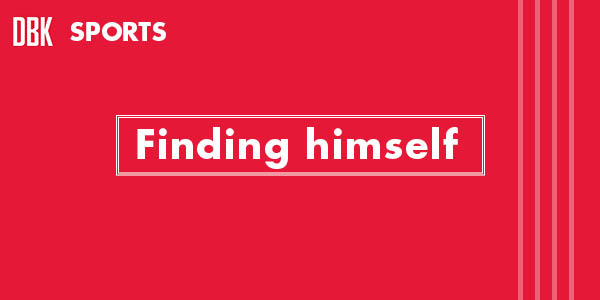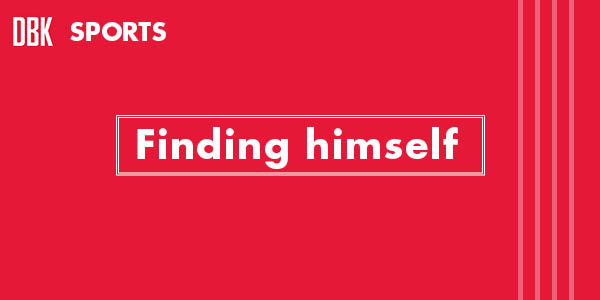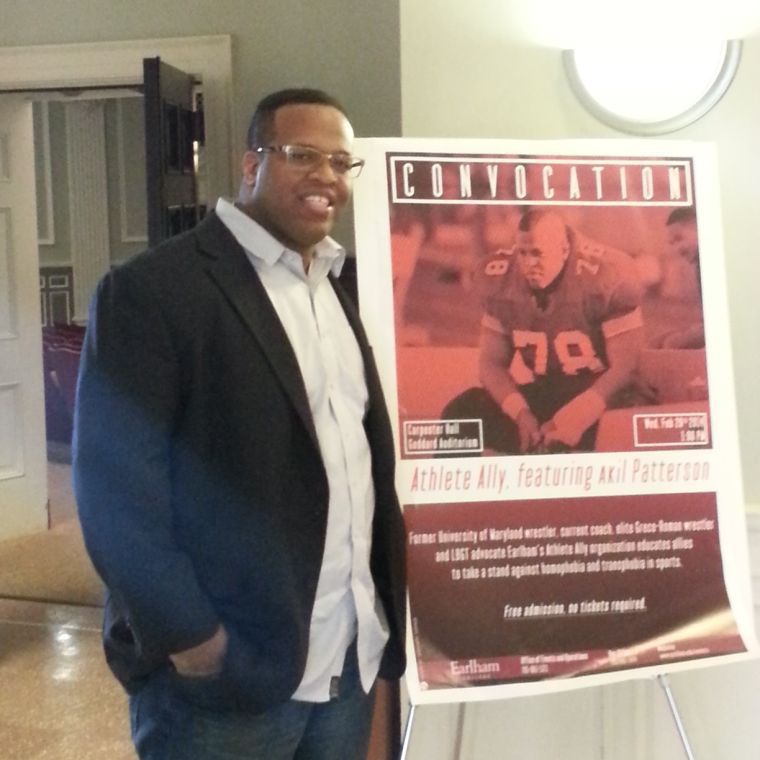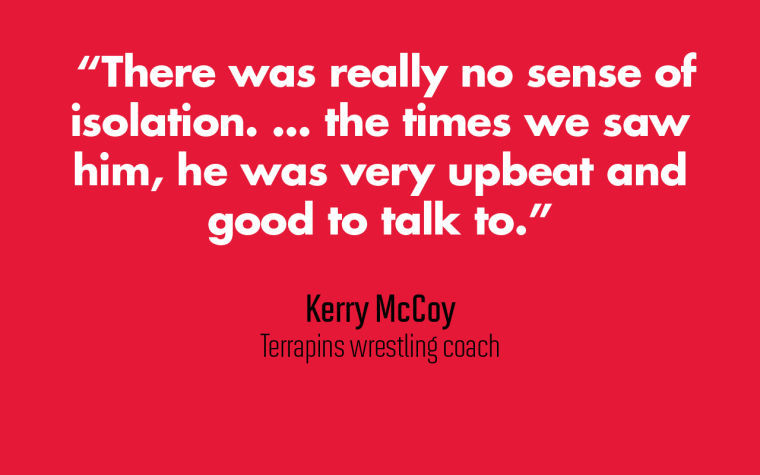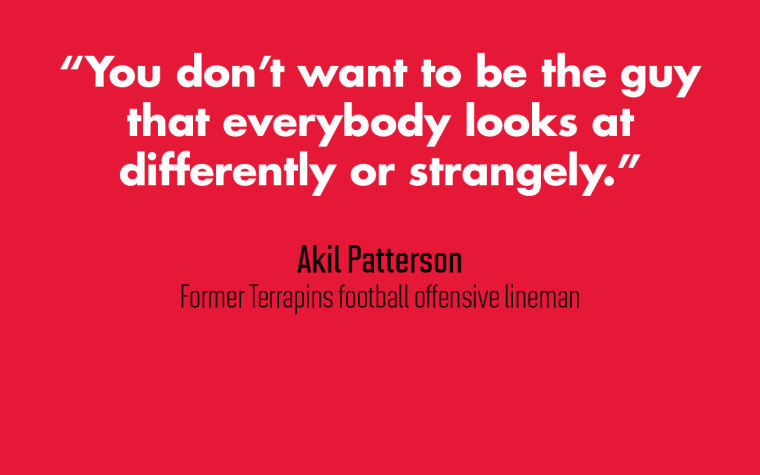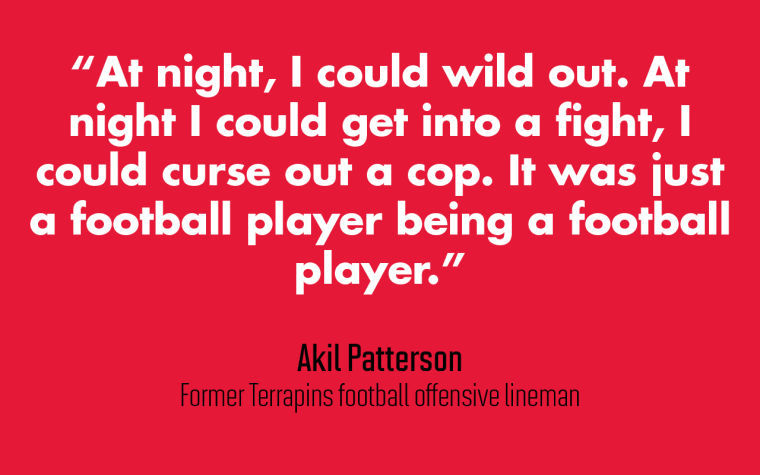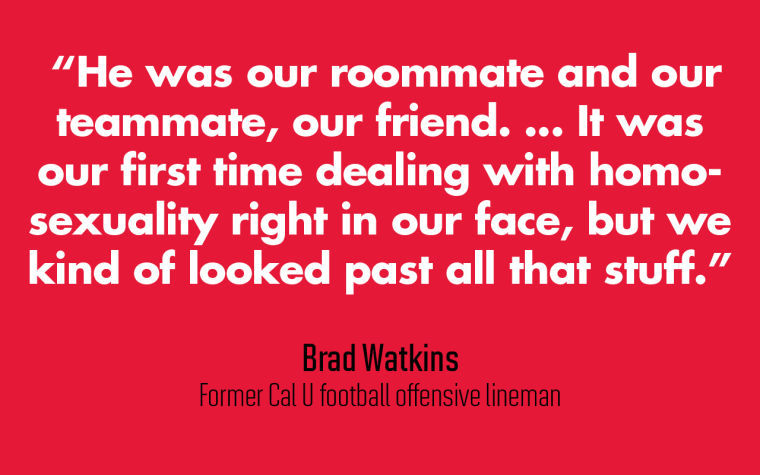As he often did, Akil Patterson remained alone in his dorm room while his Terrapins football teammates gathered to play Hacky Sack on Washington Quad and others smoked weed and powered up their Xboxes. It was fall 2002, and Patterson, desperate for answers or an inkling of support, flipped open his laptop.
The 295-pound offensive lineman in his second year at this university went to Google and typed “gay athletes” into the search bar. But the results Patterson watched pop up on the screen did little to ease his feeling of isolation.
“All I came up with was swimmers,” Patterson says more than a decade later. “That used to piss me off. I’m a jock. Everyone knew swimmers were gay. … Now I have a greater appreciation for all sports, but back then, I was like, ‘You’re not tough.’”
Patterson had kissed a man earlier that year, and he knew he was gay. But as a black sophomore in college, he was sure his young teammates and stubborn veteran coaches wouldn’t accept that. And if he couldn’t find an accurate representation of himself on the Internet, how could he explain his emotions to those around him?
He began to drink too much and curse out too many police officers, and he didn’t develop bonds with students around him.
“I couldn’t take it anymore,” Patterson says. “As a student, as a person, I couldn’t take it. I felt like I didn’t belong.”
Patterson transferred to California University of Pennsylvania in 2004, and he eventually found the support systems he says he lacked at this university. He grew comfortable with his sexuality, and about 12 years after arriving in College Park, he serves as the youth programs leader at Athlete Ally, a national nonprofit organization devoted to promoting acceptance within sports.
With the NFL draft opening last night and continuing today and tomorrow, Missouri defensive end Michael Sam is aiming to become the NFL’s first openly gay player. Since Sam came out in early February, Patterson has spent more time than usual remembering his tribulations as a homosexual athlete. And as he thinks back on his story, Patterson sees societal progress, even if there’s still work to do.
“[Patterson’s] leadership, being a role model in athletics, and his work is just fantastic,” says Brad Watkins, Patterson’s teammate at Cal U. “I don’t think there’s a better guy to lead that charge.”
TURNED AWAY
The only gay person Patterson knew of when he first arrived in College Park was Pedro Zamora, a reality star on MTV’s The Real World: San Francisco who died of AIDS in 1994. While his family has since provided support, Patterson didn’t want to talk to his Christian parents about his feelings at first. And Patterson, a four-star recruit from nearby Frederick High School, couldn’t fathom there were other gay athletes in the world in the early 2000s.

Akil Patterson
So in an attempt to learn more about his unfamiliar feelings, Patterson signed up for an LGBT course entering his junior year.
The burly offensive lineman thought he finally could be around people who understood what he was going through and study the history of homosexuality. Perhaps, he thought, that would help him cope.
But the plan crumpled when Patterson met with a coach to go over his schedule.
“He looked at it and said, ‘Why are you taking this class? What are you doing it for?’” Patterson recalls.
Nervous about backlash to revealing his true reasoning, Patterson stuttered. He replied it must have been a mistake, that the LGBT class was the only course that fit in his schedule.
So the coach removed Patterson from the class, and another opportunity to take strides toward self-acceptance slipped away.
“There was not a sensitivity there,” Patterson says.
Patterson noticed the same sort of intolerance from teammates who used gay slurs both on and off the field. Rumors about his sexuality started to spread, and Patterson didn’t confide in his teammates. He wasn’t ready to reveal his sexual orientation because he felt the culture of the sport wasn’t equipped to handle it.
In spring 2003, teammates Randy Starks and Matt Powell asked him if he was gay. The three linemen were close friends, and Starks and Powell said they’d support Patterson regardless of his sexual orientation. But Patterson again denied he was gay.
“That sounds really weird, but I don’t want to be that guy where everybody was like, ‘OK, we’ll wait and let him shower, and then we’ll come in,’” Patterson says. “You don’t want to be the guy that everybody looks at differently or strangely.”
So Patterson separated himself from his teammates. He picked fights with strangers and turned to alcohol as a means to fit in.

Akil Patterson
“It made me feel like everyone else,” Patterson says. “At night, I could wild out. At night I could get into a fight, I could curse out a cop. It was just a football player being a football player.”
But that’s not what Patterson wanted. After he watched the Terps win an ACC title in 2001 as a redshirt freshman and earned playing time in both of the next two seasons, he was suspended indefinitely for violating a team rule and decided to transfer for the spring 2004 semester.
He wanted to continue his football career but was no longer concerned with finding a program that would help him realize NFL dreams. Instead, Patterson went to Cal U, which he said had an enrollment of about 5,000 students at the time, to avoid the spotlight and pressure involved with a major football program.
FINDING A PLACE
Patterson quickly bonded with Watkins, another offensive lineman, and several of his other new teammates. Watkins and Patterson listened to Johnny Cash and unwound with some drinks together after practice.
By the fall, Patterson and Watkins shared an apartment near the campus with two other teammates. And Patterson wasn’t as concerned with hiding his sexuality as he was in College Park.
He often brought men back to his room, and his roommates just shrugged it off.
“He was our roommate and our teammate, our friend,” Watkins says. “So we don’t think too much of it. It was our first time dealing with homosexuality right in our face, but we kind of looked past all that stuff.”
Patterson eventually felt comfortable coming out to his roommates, and he especially remembers the first time he told Watkins he was gay.
“He was more in tears than I was,” Patterson jokes. “I was like, ‘I’m gay, I’m not dead.’ He’s like, ‘I’m just so happy for you. You’re being honest. And you know I love you.’”
Despite that support, Patterson still dealt with issues stemming from anxiety about his sexuality. Watkins says Patterson had a serious drinking problem and went to meetings to try to move past his reliance on liquor.
But after Patterson played for Cal U in 2004, Watkins began to notice his friend loosening up. Watkins had dozens of one-on-one chats with Patterson,and he could tell by spring 2005 that his friend was beginning to come to grips with his sexuality. Soon, he embraced it.
“Once he kind of felt comfortable in his skin, it was good,” Watkins says. “Everyone knew, and he was relaxed.”

Brad Watkins
Patterson took the 2005 season off from football to continue fighting his problems with alcohol and take time for himself, but he returned for his senior season in 2006. At that point, everybody on his team knew he was gay, yet Patterson didn’t experience much trouble.
But while Patterson relished the comforting atmosphere, he also questioned how his life would have unfolded had he been as open with Starks and Powell in College Park.
“I wish I was stronger back then,” Patterson says. “I wish I would have been able to find support and just talk to somebody.”
NEXT STEP
Patterson wasn’t attracting attention from NFL scouts at Cal U, so he knew his football days would be over after fall 2006. But that was fine. He had another dream to chase.
A former all-state heavyweight wrestler, Patterson came from a wrestling family, and he wanted to try his hand at the sport once he graduated from college. So Patterson began training as a Greco-Roman wrestler and latched on with the Terrapins wrestling team as a volunteer coach.
Soon Patterson was helping lead the Terrapin Wrestling Club, which trains young athletes, and was working out with the Terps several times a week.
Unlike his first tenure in College Park, Patterson wasn’t hiding his sexual orientation. He also didn’t rely on alcohol the way he did at this university or in his first few years at Cal U.
“There was really no sense of isolation,” Terps wrestling coach Kerry McCoy says. “Akil wasn’t a coach in an official capacity, so he wasn’t around every day. But the times we saw him, he was very upbeat and good to talk to. He’s a good friend.”
McCoy learned of Patterson’s sexual orientation through an article, but he didn’t pay much attention to it. Patterson, who worked with the wrestling team from 2008 to 2012, was comfortable discussing his sexuality and came out to several wrestlers, including All-American heavyweight Spencer Myers.
But nothing changed. Patterson continued to work out with the team, and he helped the program without any issues.

McCoy
And McCoy didn’t notice any hesitation from Patterson the way Watkins first did. In fact, McCoy ribbed his volunteer assistant about his different hairstyles and the two become close.
“He was always great to be around, and we just kind of accepted him and didn’t think about him being gay,” McCoy says.
Several years after leaving College Park with overwhelming stress, Patterson was confident and open on the campus.
“When you’re able to come out, it’s fine. People are OK. The guys were good, the coaching staff was supportive,” Patterson says. “I just needed to be honest with myself.”
MOVING FORWARD
On a Wednesday afternoon in late April, Patterson sits in his office at the North Laurel Community Center. He’s reading through emails at his full-time job as Howard County recreation coordinator while also taking calls for his volunteer work as the youth programs leader at Athlete Ally.
And in the meantime, Patterson tells his story. He discusses the pain he felt while trying to find support as a student at this university. He jokes about his time hanging out with Watkins and McCoy. And he glows about his work at Athlete Ally, through which he’s helped change the culture of youth sports and shown support for high-profile athletes who have come out as gay.
But Patterson still hears stories about coaches who fail to provide an accepting atmosphere. When he brings that up, the tone of the conversation changes.
“If we have coaches that think that, ‘Hey, sexual orientation or gender identity is a part of this,’ they need to go somewhere and rethink their life,” Patterson says, leaning forward in his office chair. “That’s what I want to root out from football. I want to root out bigotness and bias on all levels.”
Patterson says his passion results in endless hours each week preparing meetings and talking to children through Athlete Ally, a group founded by Hudson Taylor, a former Terps wrestler who is straight.
Sometimes Patterson doesn’t get any sleep, and his daily routine involves working from 7 a.m. until late into the night.
“I think it’s worth everything,” Patterson says. “There is no replacement for human life. In this moment of life when we have our opportunity to help others, we need to take full advantage of it.”
After growing comfortable with his own sexuality, Patterson has developed connections with children across the country who have reached out for help. One athlete, Michael L. Johnson, stands out in particular to Patterson.
Johnson was a promising young wrestler who joined the team at Lindenwood University in St. Charles, Missouri, in 2011. He is in jail on criminal charges related to spreading HIV.
But in his talks and texts with Johnson, Patterson has related to his situation.
Patterson believes Johnson is simply a young gay athlete who couldn’t find the support he needed, just like Patterson once was. The difference was that Johnson turned to the wrong people for support, Patterson said, and latched on to a group that did drugs and committed crimes.
“I’m thinking like, ‘Man, if this kid just had somebody in [his] life before he got to this point,’” Patterson says. “And I do see me, I see the mistakes that I was making.”
Patterson’s goal is to provide gay athletes with the support he wished he had in his first stint at this university and the support he believes could have changed Johnson’s life.
But with Sam preparing for the draft and Jason Collins playing in the playoffs with the Brooklyn Nets as the first openly gay NBA player in the playoffs, Patterson knows steps have been taken to improve acceptance in sports over the past 10 years. To show such improvements, Patterson spins around in his chair at his office to turn to his computer.
Just as he did in his dorm room 12 years earlier, Patterson goes to Google and types in “Black LGBT Athlete.” But unlike his experience as a college student, thousands of pages pop up with athletes from all sports.
“You would have done this a couple of months ago, it wasn’t the same,” Patterson says.
Then he types in “Black Legends and Leaders List,” and the first result on Google links to a page Patterson helped put together through Athlete Ally’s partnership with the National Black Justice Coalition.
The list profiles about a dozen black, openly gay athletes. Patterson scrolls around the list to Sam’s profile, Collins’ picture and a write-up on WNBA star Brittney Griner. He stops scrolling and chuckles.
On the screen is a picture of a smiling black man named Akil Patterson.
